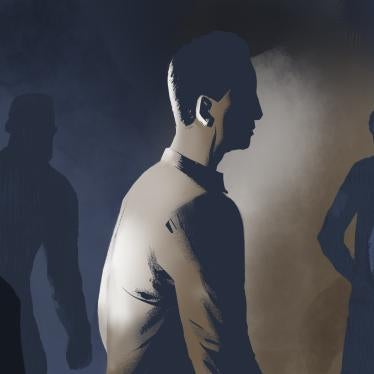The criminal verdicts in Morocco against six men sentenced to prison for homosexual conduct should be set aside and the men released, Human Rights Watch said today.
The court of first instance in Ksar el-Kbir, a small city about 120 kilometers south of Tangiers, convicted the men on December 10 of violating article 489 of Morocco’s penal code, which criminalizes “lewd or unnatural acts with an individual of the same sex.” According to lawyers for the defendants, the prosecution failed to present any evidence that the men actually had engaged in the prohibited conduct in the first place.
“These men are behind bars for private acts between consenting adults that no government has any business criminalizing in the first place,” said Sarah Leah Whitson, Middle East and North Africa director at Human Rights Watch. “The men’s rights to privacy and freedom of expression have been violated, and the court has convicted them without apparent evidence; they should be set free.”
The men have been in jail since they were first arrested by the police between November 23 and 25, 2007, after a video circulated online – including on YouTube – purporting to show a private party, allegedly including the men, taking place in Ksar el-Kbir on November 18. Press reports claimed the party was a “gay marriage.” Following the arrests, hundreds of men and women marched through the streets of Ksar el-Kbir, denouncing the men’s alleged actions and calling for their punishment.
Abdelaziz Nouaydi, a Rabat lawyer on the men’s defense team, said that the judge convicted the men even though the prosecution presented no evidence showing that an act violating Article 489 had occurred and offered only the video as evidence. The video showed no indications of sexual activity. The men all pleaded innocent to offenses under the article, which has a statute of limitation of five years. At the trial, the judge refused to release the men provisionally pending their appeals.
Criminalizing consensual, adult homosexual conduct violates human rights protection in international law. The International Covenant on Civil and Political Rights (ICCPR), which Morocco has ratified, bars interference with the right to privacy. The United Nations Human Rights Committee has condemned laws against consensual homosexual conduct as violations of the ICCPR. The United Nations Working Group on Arbitrary Detention has held that arrests for consensual homosexual conduct are, by definition, human rights violations.
In the preamble to its constitution, Morocco “subscribes to the principles, rights, and obligations” consequent on its membership in organizations including the United Nations “and reaffirms its attachment to human rights as they are universally recognized.”
The court sentenced three defendants to six months in prison and two defendants to four months; it sentenced the sixth, who it also convicted of the unauthorized sale of alcohol, to 10 months. The defendants range in age from 20 to 61 years old.
In a private letter to Moroccan Justice Minister Abdelwahed Radi before the trial, Human Rights Watch urged the government to drop the charges and release the men. The letter also urged authorities to ensure the men’s physical safety, in light of the large and menacing mass demonstrations that took place against them.
“In applying an unjust law in an unjust fashion, the Ksar el-Kbir court has fueled the forces of intolerance in Morocco,” said Whitson. “If Morocco truly aspires to be a regional leader on human rights, it should lead the way in decriminalizing homosexual conduct.”
Article 489 of the Moroccan Penal Code punishes homosexual conduct with sentences between six months and three years in prison and fines of 120 to 1,200 dirhams (US $15 to $150).







